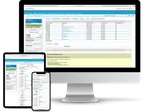
Remote Work Tips for Social Workers
Here at Network Ninja (the software company that develops Collaborate), we’ve been fully remote for many years. Fifty of us are spread out across the United States and Canada, but the physical distance doesn’t negatively impact our work - in fact, we relish the freedom of working from home offices and co-working spaces.

Here are some best practices for remote work that we’ve learned over the years, and how you can apply them within Collaborate. If you follow these guidelines, your new remote working days will flow much easier.
1. Stay On Schedule
Don’t have to report to an office at a specific time anymore? That doesn’t mean you shouldn’t try to keep your usual work schedule intact. When you start your work on time, odds are, you’ll finish on time, too.
Apply it in Collaborate

Use the built-in Calendar to see all your daily events at a glance.
Plus, Schedule Services for yourself and others in advance - you’ll thank us later when all you need to do is mark them as Completed!
2. Over-Communicate with Your Coworkers
You’re probably used to turning to a coworker sitting next to you to ask them a question, or walking over to their office for a quick chat. In a remote work environment, that’s no longer possible, but you can smartly leverage technology to keep communication flowing within your organization. The more information you’re sharing, the better - as long as it isn’t PHI via insecure means.
Apply it in Collaborate

The Message Center makes secure communication with your MDT simple. With just a few clicks, you can send an encrypted message to any User in your Collaborate site, allowing you to avoid common pitfalls like sending PHI via email.
Pro tip: In each message, you can reference Cases by searching for them by name, and inserting a link to that Case in your message.
3. Organize Your Daily Tasks
When you’re inundated with work (as social workers often are), staying organized is critical. A great way to start your day is by making a to-do list and triaging the most important items.
Apply it in Collaborate

Built-in Tasks functionality lets you create Tasks for yourself or other Users. You can also set Reminders with optional due dates.
With Assignments, you can stay on top of who is working on what, while you assign Cases and Services to yourself and others. Like Tasks, your Assignments will show up on your homepage for easy visibility.
4. Go Paperless
It may no longer be possible to have Clients or their non-offending caregivers come into your facility to physically sign off on important Documents, like Consent Forms. That doesn’t mean you have to mail them out, though - instead, use smart integrations to save time and money.
Apply it in Collaborate

The Document Templates Optional Module lets you capture Client-specific info on a Document automatically - for example, pre-populating Consent Forms with Name, Address, and other details.
Collaborate Signatures is another Optional Module that allows Clients and Service Providers to remotely sign Documents. It’s easy, cost effective, and secure.
Speaking of costs, consider this: the average U.S. social worker makes $23 an hour, and has to spend about 30 minutes per document finding, printing, sending, receiving, checking, scanning, and filing a single signed document. That means your organization spends over $11 for each and every document you get signed.

Collaborate Signatures integrates and automates this entire process - saving lots of time and money.
A Few More Remote Working Tips
- Chat is important - Email is fine for items that don’t need immediate responses from coworkers, but we find that Slack works best when you need something from a colleague quickly (it’s also great for group discussions).
- Dress for success - Putting on your normal work clothes will put you in “work mode.” We won’t judge you if you stay in pajamas once in a while, though.
- Create a solid workspace - Try to carve out your own quiet space to get work done in. This includes using a proper office chair, not something like a dining room chair, which could ruin your back after sitting in it for 8 hours. If you live with others, a door is key.
- Take frequent breaks - Stand up, walk around the house, and stay hydrated (bonus points for stretching and air squats).
- It’s ok to feel overwhelmed at times - If you haven’t worked from home before, there will certainly be an adjustment period. It takes some getting used to, but you’ve got this.
Hopefully these pointers help you adjust to the remote work environment that so many advocates are still acclimating to. If you have any questions about working remotely, or want to learn more about Collaborate, reach out to us.
